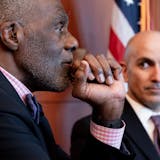
New push for Page Amendment also revives political debate.
February 2, 2021 at 2:09AM“Poor children, children of color, they don’t have power at the Legislature.” Alan Page (The Minnesota Star Tribune)
Minnesota's long and well-documented history of shortchanging students of color is at the heart of a brewing political battle over changing the state Constitution.
Advocates of the proposed Page Amendment — named for former Supreme Court Justice Alan Page, a longtime crusader for equitable public schools — want the Legislature to act this year to put it on the 2022 ballot. Supporters want Minnesota voters to approve amending the state Constitution to say that a quality education for all children is a civil right. The Constitution's current language, which dates to the beginning of statehood, requires an "adequate" and "uniform" system of education.
That means navigating the thorny education funding politics of the same Legislature that advocates believe has never done enough to change a system that has produced decades of lower standardized test scores and graduation rates for nonwhite students.
"It's a bit about power, it's a bit about politics. Poor children, children of color, they don't have power at the Legislature," Page said. "And legislators, I don't exactly know how to say this, but — if it doesn't affect your own children, it's not as dramatic of a problem, and it doesn't get addressed. That's not to say there haven't been good-faith efforts, but it's always been around the edges."
Page struck a plan with Minnesota Federal Reserve Chairman Neel Kashkari, assembling an ideologically diverse coalition of liberal and conservative legislators, Attorney General Keith Ellison and corporate leaders. Running the campaign is Nevada Littlewolf, who was President Joe Biden's Minnesota political director last year; former Republican National Committee spokeswoman Kirsten Kukowski is heading communications strategy.
An equally eclectic alliance has arrayed itself against the amendment, from the powerful state teacher's union to progressive academics to a conservative think tank.
"I don't see the plan here," said Denise Specht, president of Education Minnesota, representing more than 80,000 teachers and influential in DFL politics. "I see magic words on paper, but nobody has been able to clearly articulate to me how this would actually work, how does this make a difference?"
That complicates a Capitol push. Gov. Tim Walz is not on board, though he couldn't block legislators from putting it on the ballot. The education spending plan he released last week puts a major focus on improving racial equity in public schools.
House Speaker Melissa Hortman, DFL-Brooklyn Park, is skeptical: "I would rather focus our resources on closing the opportunity gap and improving education through the legislative process than on a litigation-based strategy." Senior House Democrats in the People of Color and Indigenous Caucus support it, including St. Paul Reps. Rena Moran and Carlos Mariani.
The amendment's backers first hoped to mount a big push in last year's legislative session, but put plans on hold when COVID-19 struck. Inequities exposed anew by the pandemic and elevated even more after the killing of George Floyd make it more needed than ever, backers say.
Still, they have provided few specifics on what would happen next if the amendment does pass, saying it would be up to state policymakers to enact legislation that meets the mandate of quality education as a civil right.

To close Minnesota's achievement gap, two leaders propose amending state Constitution
"We have a broad spectrum of legislative champions and they're all going to have a different point of view, but if we're too prescriptive we're going to end up right back where we've been for the last 30 years," said Mike McFadden, a Twin Cities investment banker and former Republican candidate for the U.S. Senate who is working to pass the amendment.
That's led to predictions of messy consequences — that dictating education policy in the state Constitution would result in more disputes over school funding levels and academic performance measures tumbling into the courts.
"Is this more legal liability on our shoulders?" asked Kirk Schneidawind, executive director of the Minnesota School Boards Association. "Is there an inherent legal aspect to this amendment for our boards to be concerned about?"